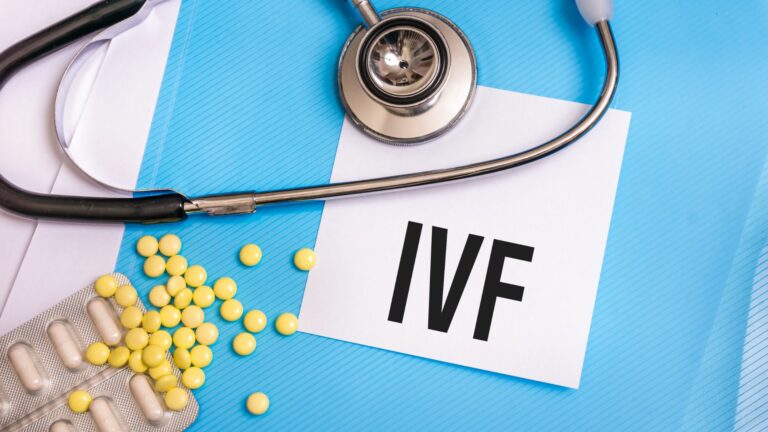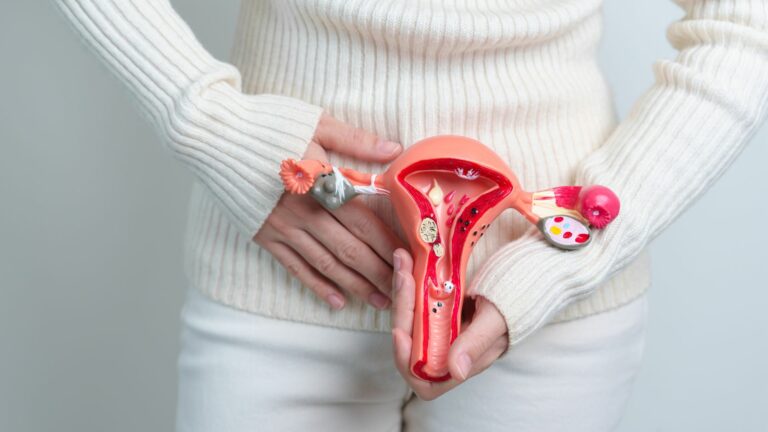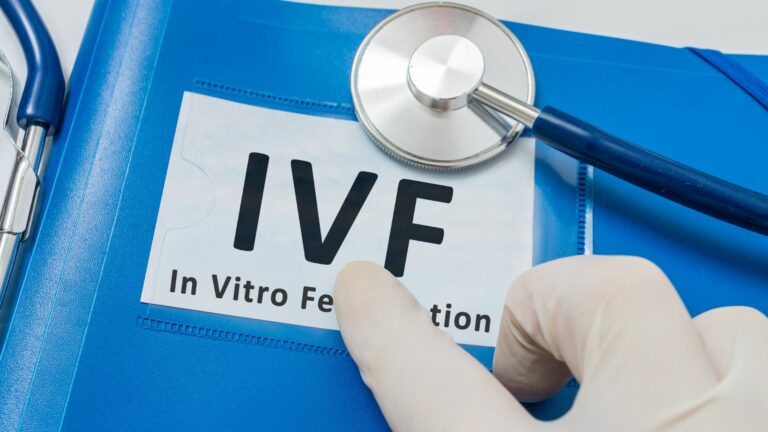
The two-week wait after an embryo transfer can be a rollercoaster of emotions for couples undergoing IVF treatment.
This crucial period, filled with anticipation and uncertainty, is when the embryo is expected to implant in the uterine lining.
Understanding the science behind this waiting period can help you navigate the ups and downs and make informed decisions throughout your IVF journey.
| Key Takeaways |
|---|
| – The two-week wait is the period between embryo transfer and the first pregnancy test. |
| – Implantation typically occurs 6-10 days after the transfer. |
| – Progesterone administered during IVF can mimic early pregnancy symptoms. |
| – The wait is necessary to allow the embryo time to implant and for hCG levels to rise. |
| – Consult with your fertility clinic for personalized guidance and support throughout the two-week wait and your IVF journey. |
The Basics of Implantation
After the embryo transfer procedure, the embryo begins its journey to implantation. This process typically takes between 6 to 10 days.
During this time, the embryo burrows into the uterine lining, where it will continue to develop if implantation is successful.
It’s important to note that early pregnancy symptoms may not occur immediately after the transfer. Even if implantation is successful, it takes time for the body to produce enough human chorionic gonadotropin (hCG), the pregnancy hormone, to cause noticeable symptoms.
The Role of Hormones
During IVF treatment, you will be administered progesterone to help prepare the uterine lining for implantation. However, progesterone can also cause symptoms that mimic early pregnancy signs, such as:
- Breast tenderness
- Bloating
- Fatigue
- Mild cramping
These side effects can make it challenging to distinguish between the effects of the hormone and actual pregnancy symptoms.
Why the Wait Matters
The two-week wait serves a crucial purpose in the IVF process:
- It allows the embryo sufficient time to implant securely in the uterine lining.
- It provides time for the body to start producing hCG if implantation is successful.
- It ensures that a pregnancy test will provide accurate results by allowing hCG levels to rise to detectable levels.
Trying to test too early may lead to false-negative results, causing unnecessary stress and disappointment.
Remember, the two-week wait is a critical part of your IVF journey. Trusting the process and focusing on self-care during this time can help you manage the emotional challenges that may arise.
For more information and support, consult the following resources:
- American Society for Reproductive Medicine (ASRM)
- Mayo Clinic – IVF
- Your fertility clinic’s blog or resources on the two-week wait
As you navigate this crucial period, remember that your fertility clinic is your best resource for personalized guidance and support.
Don’t hesitate to reach out to your IVF doctor with any concerns or questions you may have during the two-week wait.
Common Physical Symptoms (and What They May or May Not Mean)
During the two-week wait, you may experience various physical symptoms that can be confusing and even misleading.
Some of these symptoms may be related to the IVF medications, while others could potentially indicate early pregnancy.
It’s essential to understand these common symptoms and what they may or may not signify.
Spotting or Light Bleeding
Spotting or light bleeding after an embryo transfer can be a normal occurrence. This may be due to the transfer procedure itself or the hormonal changes in your body.
However, if you experience heavy bleeding or severe pain, it’s crucial to contact your fertility clinic immediately.
Cramping
Mild cramping, similar to menstrual cramps, is another common symptom during the two-week wait.
This can be caused by the progesterone supplementation, the embryo implantation process, or simply the emotional stress of the waiting period.
If the cramping becomes severe or persists, consult your IVF team for guidance.
Other Potential Symptoms
You may also experience other symptoms during the two-week wait, such as:
- Bloating
- Breast tenderness
- Fatigue
- Nausea
- Mood swings
Remember that these symptoms can be caused by both the IVF medications and early pregnancy, making it difficult to determine the actual cause.
| Tip: Tracking Your Symptoms |
|---|
| Consider keeping a journal or using a symptom tracking app to record any physical symptoms you experience during the two-week wait. This information can be helpful when discussing your experience with your fertility clinic or for your own reference if you undergo future IVF cycles. |
While it’s tempting to analyze every twinge and sensation, it’s important not to get too caught up in symptom-spotting.
Every woman’s experience is unique, and the presence or absence of specific symptoms does not necessarily indicate the success or failure of the IVF cycle.
When to Contact Your Fertility Clinic
Although some physical symptoms are common during the two-week wait, there are certain situations in which you should contact your fertility clinic immediately:
- Heavy bleeding or severe pain
- Persistent, severe cramping
- High fever (over 100.4°F or 38°C)
- Any other concerning symptoms or changes in your health
Your fertility clinic is your best resource for personalized guidance and support during this time. They can help you understand your symptoms and provide the necessary care and advice.
For more information on common symptoms during the two-week wait, check out these resources:
- The Two-Week Wait: Symptoms, Emotions, and Coping Strategies from Very Well Family
- Two-Week Wait (2WW) Survival Tips from Attain Fertility
Remember, every woman’s IVF journey is unique. Don’t hesitate to reach out to your support system, whether it’s your partner, friends, family, or online fertility communities, for the emotional support you need during this challenging time.
Emotional Well-being: Coping with Anxiety and Uncertainty
The two-week wait can be an emotional rollercoaster, filled with anxiety, uncertainty, and anticipation.
It’s entirely normal to feel a wide range of emotions during this time, from excitement and hope to fear and worry.
Acknowledging and validating these feelings is an essential step in taking care of your emotional well-being.
The Emotional Toll of the Two-Week Wait
The two-week wait is often described as the most challenging part of the IVF process. The uncertainty of not knowing whether the treatment has been successful can be mentally and emotionally exhausting.
You may find yourself constantly analyzing every symptom or lack thereof, searching for signs of pregnancy.
It’s important to remember that these feelings are valid and shared by many women going through IVF. You are not alone in this experience, and it’s crucial to be kind and compassionate towards yourself during this time.
Self-Care Strategies
Taking care of your emotional well-being during the two-week wait is just as important as taking care of your physical health.
Here are some self-care strategies that may help you cope with the anxiety and uncertainty:
- Practice mindfulness and relaxation techniques, such as deep breathing, meditation, or gentle yoga. Apps like Headspace or Calm can guide you through these exercises.
- Keep a journal to process your emotions and thoughts. Writing down your fears, hopes, and aspirations can be a therapeutic outlet.
- Engage in activities that bring you joy and help you relax, such as reading, listening to music, or spending time in nature.
- Set boundaries around your social media and internet usage, especially if you find yourself constantly searching for IVF success stories or pregnancy symptoms.
- Plan distracting activities, such as movie nights, lunch dates with friends, or exploring a new hobby, to keep your mind occupied during the waiting period.
Remember, self-care looks different for everyone. Find the strategies that work best for you and prioritize your emotional well-being throughout your IVF journey.
Seeking Support
One of the most important things you can do during the two-week wait is to seek support from others who understand what you’re going through. This can include:
- Your partner: Open communication with your partner is crucial during this time. Share your feelings, fears, and hopes with each other, and lean on one another for support.
- Close friends and family members: Confide in trusted friends or family members who can offer a listening ear and emotional support.
- Online fertility communities or support groups: Connecting with others who are also going through IVF can provide a sense of camaraderie and understanding. Organizations like RESOLVE offer online communities and local support groups.
- Professional counselors: If you’re struggling with intense anxiety or depression, consider reaching out to a mental health professional who specializes in fertility-related issues. Many fertility clinics offer counseling services or can provide referrals.
| Tip: Creating a Support System |
|---|
| Before starting your IVF journey, consider reaching out to a few close friends or family members to create a support system. Let them know about your treatment plan and how they can best support you during the two-week wait and beyond. Having a predetermined support network can make it easier to reach out when you need help or encouragement. |
Remember, seeking support is a sign of strength, not weakness. Surround yourself with people who uplift and encourage you during this emotionally challenging time.
For more information on coping with the emotional aspects of the two-week wait, explore these resources:
- Coping with the Stress of Infertility from the American Psychological Association
- RESOLVE: The National Infertility Association – Provides support groups, helpline, and resources for those struggling with infertility.
In addition to online communities and support groups, you may also find local resources and fertility clinics in your area that offer support services.
Some cities with notable IVF centers include Gurgaon, Bhubaneswar, Mangalore, Guwahati, Dehradun, Kolapur, Warangal, Mira-Bhayander, and Thiruvananthapuram.
Reach out to local clinics or support networks to find resources tailored to your specific location and needs.
Dos, Don’ts, and Debunking Myths
During the two-week wait, you may come across a lot of advice and information from various sources, such as friends, family, or the internet.
Some of this information may be helpful, while some may be inaccurate or even harmful. In this section, we’ll discuss the dos and don’ts of the two-week wait and debunk some common myths surrounding this period.
Do: Follow Your Clinic’s Instructions
The most important thing you can do during the two-week wait is to follow the specific instructions provided by your fertility clinic. These may include:
- Taking your prescribed medications, such as progesterone supplements, as directed.
- Attending scheduled appointments for blood tests or ultrasounds.
- Following any activity restrictions or guidelines, such as avoiding strenuous exercise or certain foods.
Your fertility clinic’s instructions are tailored to your specific case and are based on the most up-to-date scientific evidence.
Adhering to these guidelines can help optimize your chances of success and ensure the best possible care throughout your IVF journey.
Don’t: Obsess Over Symptoms
One of the biggest challenges during the two-week wait is avoiding the temptation to obsess over every potential symptom or lack thereof.
It’s important to remember that many of the “pregnancy symptoms” you may experience, such as breast tenderness, bloating, or fatigue, can also be caused by the IVF medications or normal hormonal fluctuations.
Constantly analyzing your body for signs of pregnancy can lead to unnecessary stress and anxiety. Instead, try to focus on self-care activities and find healthy distractions to keep your mind occupied during this waiting period.
Debunking Common Myths
There are many misconceptions and myths surrounding the two-week wait. Let’s debunk a few of the most common ones:
| Myth | Fact |
|---|---|
| Bed rest is necessary for implantation. | While it’s important to avoid strenuous activities, there is no scientific evidence to support the need for strict bed rest. In fact, light physical activity, such as walking, can help promote circulation and reduce stress. |
| Certain foods or activities can negatively impact implantation. | In general, most normal activities and foods will not affect the implantation process. However, it’s always best to consult with your fertility clinic for personalized advice. |
| Experiencing symptoms means the IVF treatment has been successful. | Symptoms during the two-week wait can be misleading. The only definitive way to determine if the treatment has been successful is through a pregnancy test on the day instructed by your clinic. |
It’s essential to be cautious about the information you come across online or through well-meaning friends and family.
Always consult with your fertility clinic for the most accurate and up-to-date information regarding your specific case.
For more information on dos, don’ts, and myths during the two-week wait, check out these resources:
Remember, the two-week wait is a highly individual experience. What works for one person may not work for another.
Trust your instincts, prioritize your well-being, and don’t hesitate to reach out to your IVF doctor or support system when needed.
Preparing for the Outcome
As the two-week wait comes to an end, it’s natural to feel a mix of excitement, nervousness, and anticipation.
Preparing yourself emotionally for the possible outcomes can help you navigate this challenging time with greater resilience and clarity.
The Importance of Waiting
One of the most crucial aspects of the two-week wait is following your clinic’s instructions on when to take a pregnancy test.
Testing too early can lead to false results, as the hCG levels may not be high enough to detect a pregnancy. This can cause unnecessary stress and disappointment.
Your fertility clinic will advise you on the optimal day to take a pregnancy test, which is typically around 14 days after the embryo transfer.
Waiting until this designated day ensures the most accurate results and allows your IVF team to provide the appropriate guidance and support.
Managing Expectations
As you approach the end of the two-week wait, it’s essential to manage your expectations and prepare yourself for both possible outcomes: a positive or a negative pregnancy test.
| Positive Test | Negative Test |
|---|---|
| A positive test result is an exciting and joyous moment. However, it’s important to remember that this is just the first step in the pregnancy journey. Your fertility clinic will schedule further blood tests to monitor your hCG levels and ensure the pregnancy is progressing as expected. | A negative test result can be devastating and emotionally challenging. It’s crucial to allow yourself time to grieve and process the disappointment. Remember that a negative result does not define your worth or diminish your chances of success in future IVF cycles. |
Regardless of the outcome, it’s essential to have a support system in place to help you navigate the emotions that may arise.
This can include your partner, close friends or family members, online support communities, or professional counselors specializing in fertility issues.
Next Steps
After receiving the results of your pregnancy test, your fertility clinic will provide guidance on the next steps.
If the test is positive, your clinic will schedule additional blood tests and ultrasounds to monitor the pregnancy’s progress. They will also provide instructions on continuing your medications and any necessary lifestyle adjustments.
If the test is negative, your clinic will schedule a follow-up appointment to discuss the cycle outcome and explore options for future treatments.
They may recommend additional testing, adjustments to your treatment protocol, or alternative IVF options based on your specific case.
Remember, a negative result does not mean the end of your journey. Many couples achieve success in subsequent IVF cycles or explore other paths to parenthood, such as IVF with donor eggs or sperm, or adoption.
Resilience and Hope
Regardless of the outcome, it’s important to acknowledge the strength and resilience you’ve demonstrated throughout your IVF journey.
The two-week wait is a testament to your courage, determination, and the love you have for your future family.
Remember to be kind to yourself and celebrate the small victories along the way. Each step of the IVF process, including the two-week wait, brings you closer to your ultimate goal of parenthood.
| Tip: Focusing on Self-Care |
|---|
| In the days leading up to your pregnancy test, prioritize self-care activities that bring you comfort and peace. This may include spending quality time with loved ones, engaging in hobbies or relaxation techniques, or treating yourself to a favorite meal or activity. Remember, your well-being is paramount during this time. |
For more information and support on preparing for the outcome of your IVF cycle, consider these resources:
- RESOLVE: The National Infertility Association – Provides support groups, helpline, and resources for those struggling with infertility
- The IVF Companion: The Two Week Wait – An e-book offering practical and emotional support during the two-week wait
No matter the outcome, your IVF journey is a testament to your resilience and strength. Keep hope alive, lean on your support system, and remember that your fertility clinic is there to guide you every step of the way.
Conclusion
The two-week wait is a challenging and emotionally charged period in the IVF journey. By understanding the science behind this crucial time, recognizing common symptoms, and prioritizing your emotional well-being, you can navigate the waiting period with greater resilience and self-compassion.
Remember, every IVF journey is unique, and there is no one-size-fits-all approach to coping with the two-week wait. Trust your instincts, lean on your support system, and don’t hesitate to reach out for help when needed.
As you move forward, take comfort in knowing that you are part of a compassionate and resilient community of individuals who understand the complexities of the IVF experience.
Your journey is a testament to the power of hope, the strength of the human spirit, and the unwavering love you have for your future family.
Embrace the support of your loved ones, your fertility clinic, and the wider infertility community as you continue to navigate the path to parenthood with courage, hope, and self-compassion.






